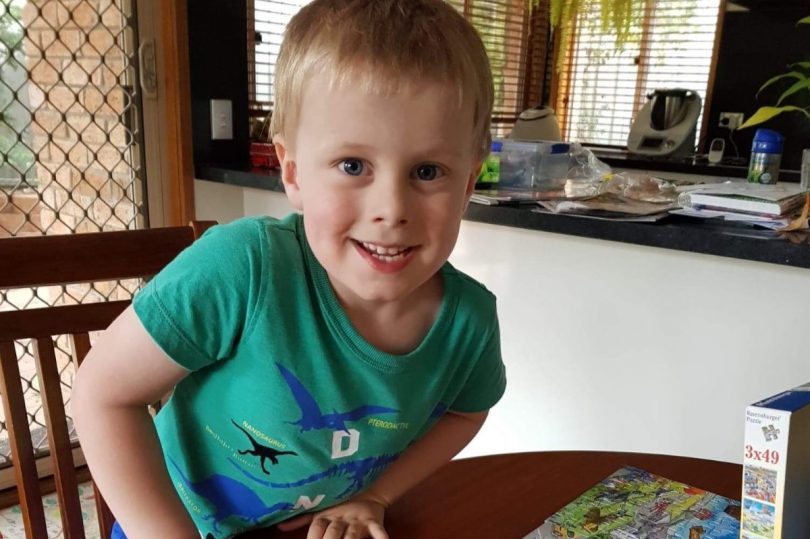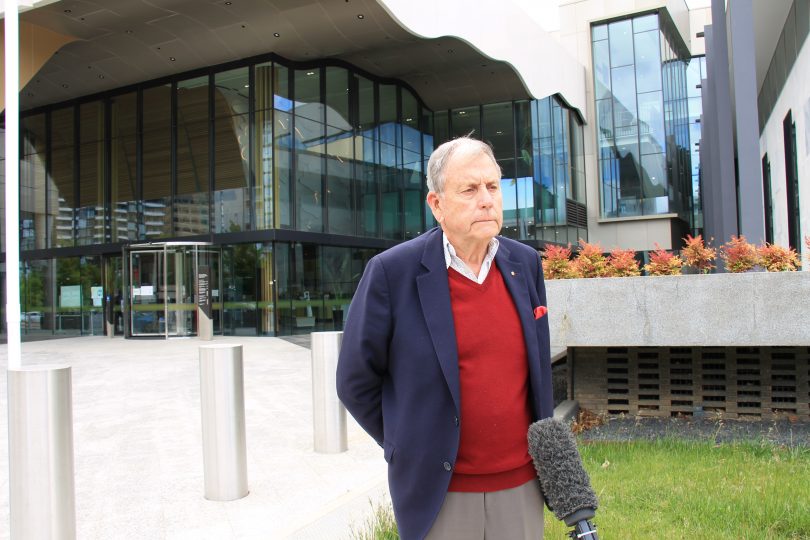
Four-year-old Blake Corney’s life was tragically cut short in a car crash. Photo: Supplied.
A coronial inquest into the tragic death of toddler Blake Corney has recommended the mandatory reporting of truck drivers with suspected health conditions and encouraged the government to expedite safer driving technologies that could have saved his life.
Chief Coroner Lorraine Walker was tearful at times when handing down her findings in the ACT Coroners Court on Monday (15 November), attended by members of Blake’s family.
Four-year-old Blake, his parents and his younger brother were driving to Toys’ R’ Us at the Majura Park Shopping Centre on 28 July 2018 and had stopped at an intersection on the Monaro Highway when Akis Emmanouel Livas crashed his truck into the back of their car at 70 km/h.
Blake was killed, but his family survived. Livas pleaded guilty to causing his death and was jailed for at least two years and three months in the ACT Supreme Court.
According to the court, medical records showed Livas had a possible diagnosis of sleep apnoea going back as far as 2013.
But when he applied for his job as a truck driver in 2017 and renewed his heavy vehicle drivers licence in 2018, he said he did not have any condition that could affect his driving ability.
After the crash, in 2019, he was diagnosed with the condition.
While all ACT drivers must report health conditions that may impact their ability to drive, there is currently no requirement for medical practitioners to report such information to authorities about their patients.
Coroner Walker said if practitioners had to do such reporting, then it was likely many potentially dangerous drivers could be identified in advance of accidents.
She also discussed using safety technologies, such as autonomous emergency braking (AEB) and fatigue and distraction detection technologies (FDDTs).
“Having regard to the evidence before me, I am satisfied that had Mr Livas been driving a truck with an AEB system fitted, Blake may still be alive today,” she said.
She said while the inquest had heard it was likely AEBs would be mandated in Australia in 2022, Australia was still a decade behind Europe.
Coroner Walker said Livas applied his truck’s brakes just before the impact in the crash and found that if he braked earlier, or if braking occurred autonomously, then the collision may have been avoided, or at least been less forceful.
The likely explanation for his inattention was a microsleep or distraction, she said.
She ultimately recommended the ACT Government consider whether to instigate mandatory reporting for health practitioners if they believe their patient has health issues that could endanger the public when driving heavy vehicles, as well as that it mandates that independent health examinations be conducted for those applying for certain classes of heavy vehicle licence.
Also, she said the government should consider incentives to encourage the uptake of AEB and FDDTs by trucking operators and pursue mandatory implementation of such technologies in heavy vehicles in Australia.

Andrew Corney and Camille Jago speak about the findings from the inquest into the death of their son Blake Corney. Photo: Albert McKnight.
Speaking after the inquest, Blake’s mother, Camille Jago, said Australia was behind in the uptake of mandatory safety measures in vehicles.
“My son Blake may not have died that horrific day if heavy vehicles had currently available safety features, or if there had been better information sharing of medical records for heavy vehicle licence holders,” she said.
“I cannot have Blake back in his physical form. But I can advocate for changes that may prevent similar deaths to Blake’s.
“It is one of the few ways that I can continue to mother Blake, and I will continue to do that.”
Blake’s father, Andrew Corney, urged the ACT Government to adopt all the recommendations “in a meaningful way, not just pay lip service”.
“Hopefully, this will help others not step into our shoes and go through the tragedy that really continues every day for our lives,” he said.
Mr Jago said there are many ways to help pressure for change, such as through consumer power.
“The next time you order landscape supplies, or any supplies that require the use of a heavy vehicle, ask if the supplier’s trucks include autonomous emergency braking,” she said.
“We all have personal power. Ask your GP if your symptoms may affect your driving and act responsibly.”
She also urged voters to contact their political representatives to push for reform.

Lauchlan McIntosh of the Towards Zero Foundation addressed media after the Blake Corney inquest. Photo: Albert McKnight.
Towards Zero Foundation chairman Lauchlan McIntosh said the inquest’s recommendations were very useful.
“What’s disappointing more than anything is the failure by the federal government to actually mandate autonomous emergency braking and fatigue devices,” he said.
“We saw some mandating for AEB in cars last week, but no mention of trucks.
“In Europe, these technologies were mandated years ago, years ago, and we are seeing no action from the federal government. It’s outrageous.”














Russell Nankervis no common sense at all View